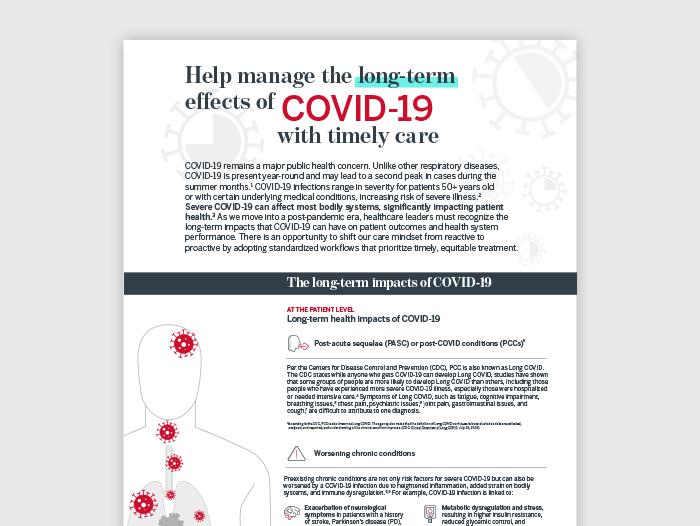Auto logout in seconds.
Continue LogoutCDC on Friday announced that individuals who test positive for COVID-19 don't need to isolate for five days, a change in guidance that drew mixed responses from health experts.
CDC changes COVID-19 isolation guidance
In the new guidance, CDC said people who test positive for COVID-19 can return to work and regular activities if their symptoms are mild and improving and if it's been a day since they've had a fever.
However, guidance for workers at nursing homes and other healthcare facilities did not change, meaning medical personnel who test positive for COVID-19 still need to stay home for at least seven days after their symptoms first appear and must test negative within two days of returning to work.
Officials noted that other countries, as well as California and Oregon, have made similar changes to their COVID-19 isolation guidance and did not see an increase in cases.
"Our goal here is to continue to protect those at risk from severe illness while also reassuring folks that these recommendations are simple, clear, easy to understand, and can be followed," said CDC Director Mandy Cohen. "We are in a different place, both in the level of protection people have against these illnesses and the tools we have available."
Cohen noted there have been sharp decreases in COVID-related hospitalizations and deaths this winter compared to previous years and added that the vast majority of hospitalizations had occurred among Americans who didn't receive the most recent COVID-19 vaccines.
Brendan Jackson, who leads CDC's respiratory virus response team, said the agency is grouping its recommendation for COVID-19 with other respiratory illnesses because the symptoms are difficult to tell apart, the viruses spread in a similar way, and they can be prevented with similar strategies.
CDC emphasized that everyone should continue to try and prevent infections by getting vaccinated, washing their hands, and taking steps to bring in more outdoor air.
How experts are reacting
Some experts applauded CDC's change in guidance. Céline Gounder, an infectious disease specialist at Bellevue Hospital Center and editor at large for KFF Health News, said she believes the change "makes a lot of sense, because people are not testing."
"If you don't know which virus you have, how are you supposed to follow the right guidance for Covid versus flu versus R.S.V versus the common cold virus?" she said.
Aaron Glatt, an infectious disease doctor and hospital epidemiologist at Mount Sinai South Nassau Hospital, said the change is a "reasonable move."
"When you're doing public health, you have to look at what is going to be listened to, and what is doable," Glatt said.
Lori Tremmel Freeman, CEO of the National Association of County and City Health Officials, said she believes the change is "an effort to try to create guidance for the public that is easy to follow and that doesn't require a tremendous amount of thinking or referencing. And also at the same time, an effort to try to get to language that isn't polarizing."
Freeman acknowledged that getting rid of terms like quarantine and isolation "for long-time public health people, it doesn't feel that great. But there's also a recognition of the time that we're in, and we'd rather have people understand what to do to easily address their illness rather than fight with them about it."
However, other health experts disagreed with the change, with some arguing for what's called "COVID exceptionalism," or the idea that COVID-19 should be treated differently than other respiratory infections.
Although cases have since fallen from their pandemic highs, COVID-19 continues to pose a significant risk to vulnerable populations, including older adults and those with other medical conditions. Currently, CDC data shows that there are over 20,000 hospitalizations and more than 2,000 deaths from COVID-19 each week.
Ellie Murray, an assistant professor of epidemiology at Boston University's School of Public Health, said it's reasonable to want to treat COVID-19 like other respiratory diseases, "but you can't just discard the science."
"It's not good science. It's not good public health," she said. "It doesn't provide people with accurate information."
Rather than applying the lessons we've learned from the pandemic to protect people from other infections like the flu, rolling back COVID-19 precautions sends a harmful message, Murray said.
"It's undermining the whole rest of the public health system," she said. "Because what people are hearing is, 'Actually, diseases aren't as bad as we'd said they were, and we don't actually need to do anything. It's not actually that bad if some people die.'"
"I completely disagree with the idea there is no Covid exceptionalism," said Eric Topol, founder and director of the Scripps Research Translational Institute. "The overwhelmingly abundant evidence for this virus over the past four years tells us that it is a far more dangerous pathogen than flu, which lacks seasonality, is still evolving, has induced Long Covid in tens of millions of throughout the worlds, and cannot be 'FLU-ified.'" (Stobbe, Associated Press, 3/1; Mandavilli, New York Times, 3/1; Knutson, Axios, 3/1; Landman, Vox, 3/1; Branswell, STAT, 3/1; Goodman, CNN, 3/1)
Use our resource library to learn how health plans can manage the impact of COVID-19 and what to prepare for next.
Don't miss out on the latest Advisory Board insights
Create your free account to access 1 resource, including the latest research and webinars.
Want access without creating an account?
You have 1 free members-only resource remaining this month.
1 free members-only resources remaining
1 free members-only resources remaining
You've reached your limit of free insights
Become a member to access all of Advisory Board's resources, events, and experts
Never miss out on the latest innovative health care content tailored to you.
Benefits include:
You've reached your limit of free insights
Become a member to access all of Advisory Board's resources, events, and experts
Never miss out on the latest innovative health care content tailored to you.
Benefits include:
This content is available through your Curated Research partnership with Advisory Board. Click on ‘view this resource’ to read the full piece
Email ask@advisory.com to learn more
Click on ‘Become a Member’ to learn about the benefits of a Full-Access partnership with Advisory Board
Never miss out on the latest innovative health care content tailored to you.
Benefits Include:
This is for members only. Learn more.
Click on ‘Become a Member’ to learn about the benefits of a Full-Access partnership with Advisory Board
Never miss out on the latest innovative health care content tailored to you.


